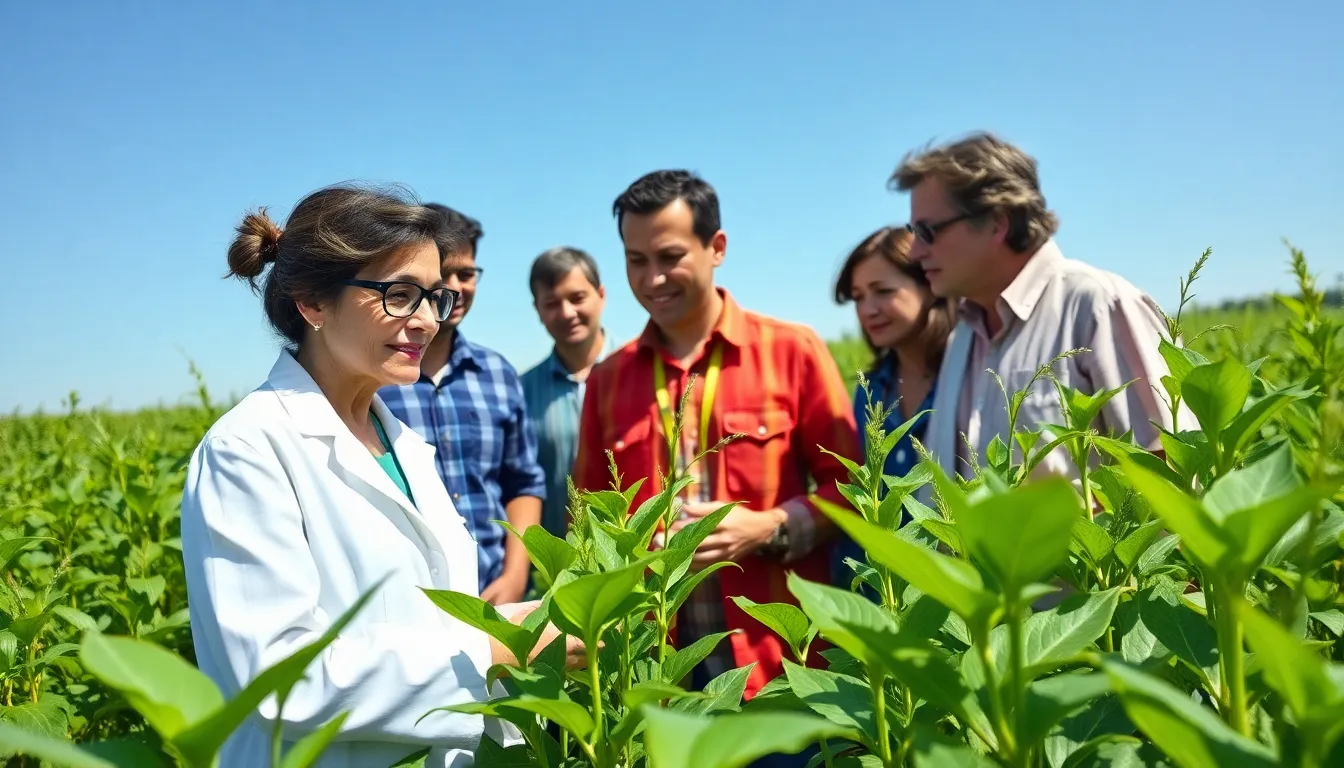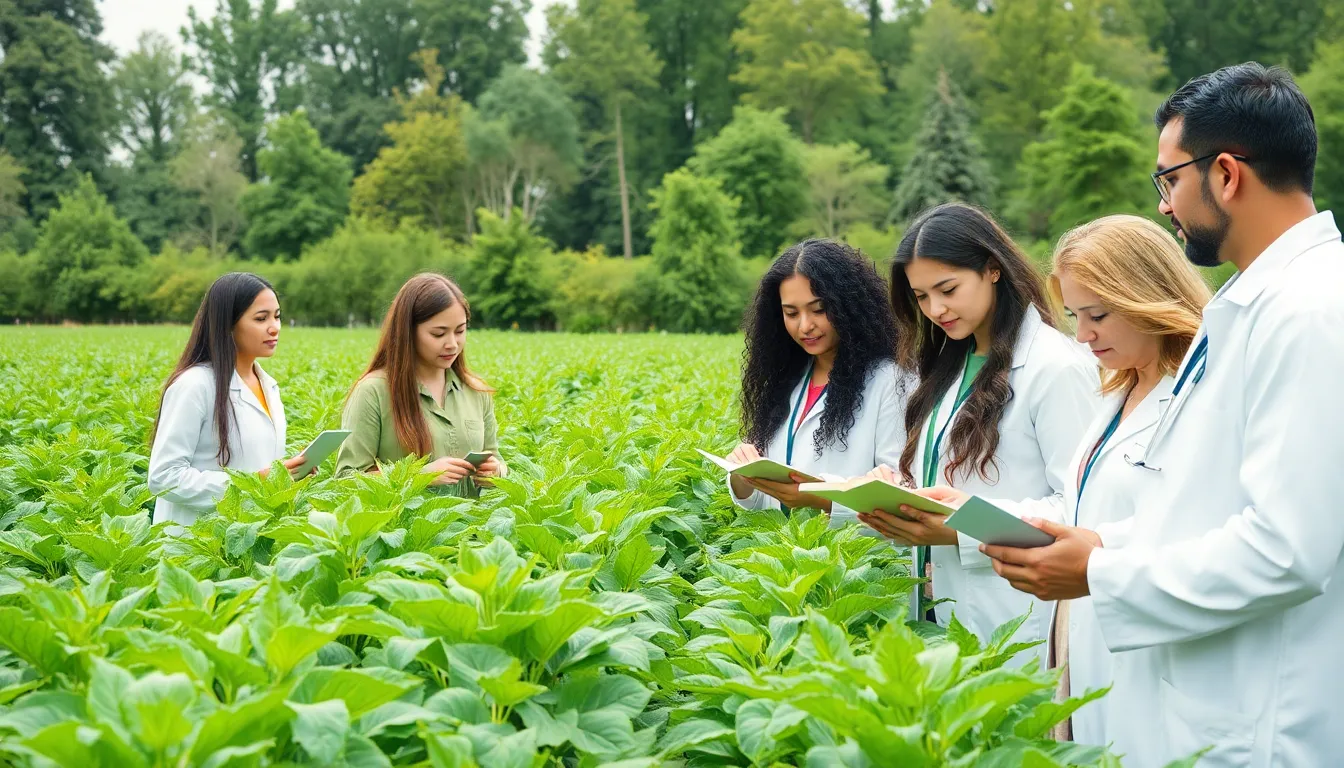Phone:
(701)814-6992
Physical address:
6296 Donnelly Plaza
Ratkeville, Bahamas.

In a world where plants seem to be quietly plotting their takeover, staying updated on plant science news is more crucial than ever. From quirky discoveries about plant communication to groundbreaking research on sustainable agriculture, the green kingdom is full of surprises. Who knew that your houseplants could be gossiping about you while you’re at work?
Recent developments in plant science reveal exciting opportunities in genetic engineering and breeding. Cutting-edge research continues to transform agriculture.
CRISPR technology allows precise modifications to plant DNA, enhancing traits like disease resistance and yield. New modifications can significantly increase crop resilience against environmental stressors. Studies show that edited crops, such as drought-resistant wheat, could positively impact food security. Enhanced nutritional profiles in crops also emerge from genetic advancements, benefiting human health. Scientists publish findings that highlight the potential of engineered plants in combating global challenges.
Advanced molecular techniques revolutionize traditional plant breeding methods. Genomic selection leads to quicker identification of desirable traits. Recent collaborations between scientists and farmers facilitate the development of climate-adapted varieties. These new varieties often exhibit improved growth rates, supporting sustainable practices. Innovative practices contribute to a diverse gene pool, ensuring adaptability in changing environments. Successful breeding programs showcase the importance of integrating modern technology into agriculture.

Plant research continually adapts to environmental impacts. This adaptation is essential as climate change significantly influences biodiversity.
Climate change drives shifts in plant distribution and diversity. Increased temperatures favor some species while threatening others, leading to habitat loss. Pollination patterns also change, disrupting relationships between plants and their pollinators. A recent study found that 60% of plants face extinction due to climate-related stressors. Understanding these dynamics allows researchers to develop strategies for conserving endangered species. The focus shifts to preserving genetic diversity, enabling plants to adapt to changing environments more effectively.
Sustainable practices play a crucial role in modern agriculture. Techniques such as crop rotation and agroforestry enhance soil health while reducing dependency on chemical fertilizers. Implementing these methods increases resilience against pests and diseases. A recent report shows that 30% of farmers adopting sustainable approaches reported higher yields. Integrating technology, such as precision farming, optimizes resource use and minimizes waste. As farmers embrace these practices, they contribute to the overall health of ecosystems. Restoring balance helps safeguard future food security amidst ongoing environmental challenges.
Recent research continues to shed light on fascinating aspects of plant science. Discoveries range from innovative physiological mechanisms to complex interactions between plants and microbes.
Significant advancements in plant physiology reveal critical mechanisms that regulate growth and stress responses. Recent studies demonstrate how hormonal signaling plays a vital role in adapting to environmental stressors, such as drought and heat. Plants like Arabidopsis thaliana exhibit unique responses that prioritize survival during adverse conditions. Research indicates that specific genes activate protective pathways, improving resilience. Notably, findings show that manipulating these pathways enhances crop yield and stability. Observations suggest that understanding these processes leads to more robust agricultural practices.
Emerging research underscores the importance of plant-microbe interactions in enhancing plant health and productivity. Studies indicate that beneficial microbes, such as mycorrhizal fungi, significantly improve nutrient uptake, particularly phosphorus. Insights from recent experiments illustrate how plants recruit these microbes through signaling molecules. Similarly, specific bacteria stimulate plant growth by producing growth-promoting substances. Evidence supports that optimizing these interactions can lead to increased resistance against pests. Researchers emphasize the potential of harnessing these relationships to improve sustainable agricultural practices. Contributions to soil health and enhanced crop performance highlight the importance of these findings.
Conferences and events in plant science provide vital networking and collaboration opportunities. Attendees gain insight into emerging research and innovative techniques.
Several upcoming symposiums focus on cutting-edge research. The International Symposium on Plant Biology will occur in July 2024, exploring topics such as genetic engineering and plant resilience. Additionally, the Global Conference on Sustainable Agriculture is set for September 2024, highlighting advancements in sustainable practices and technology integration. Another noteworthy event, the Plant Science Summit, takes place in November 2024, emphasizing plant-microbe interactions and their roles in promoting agricultural sustainability. Participants can engage with leading experts and contribute to discussions that shape the future of plant science.
Recent conferences in plant science showcased impactful findings. The Plant Biology Conference held in April 2023 highlighted studies on plant communication, revealing mechanisms behind how plants respond to environmental cues. Another significant event, the World Congress on Horticulture, took place in August 2023, emphasizing innovative practices in crop management and environmental adaptability. Keynote speakers included renowned researchers who presented breakthroughs in CRISPR applications for enhancing crop yields. Networking sessions allowed participants to exchange ideas and foster collaboration, reflecting the ongoing commitment to advancing the field of plant science.
Staying updated on plant science is crucial for understanding the intricate relationships between plants and their environments. The ongoing research not only uncovers the remarkable capabilities of plants but also highlights the urgent need for sustainable practices in agriculture. As new technologies emerge and traditional methods evolve, the potential for enhancing food security and biodiversity becomes increasingly tangible.
Engagement in conferences and collaboration among researchers will continue to drive innovation in this field. By embracing the latest advancements and fostering a commitment to sustainability, the future of plant science holds promise for addressing pressing global challenges.